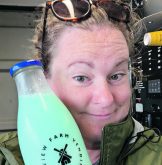On a warm afternoon in May, a car bearing strange licence plates pulled up in front of our four-room school at recess time.
Play was temporarily suspended as all eyes followed the tall portly driver striding across the school grounds. He approached the principal, who had been umping a rowdy game of scrub baseball.
“I’m an entertainer and I’d like to rent the school for a performance tomorrow night.”
The air was immediately charged with mystery. Who was this stranger?
Nobody had a clue, so the principal sent him to the chair of the school board, who routed him to the caretaker, who agreed to open the doors of the school and set up the chairs “for two dollars, cash on the barrel head.”
Read Also

Rural Manitoba resources slim on natural disaster planning
A study from Brandon University’s Rural Development Institute has found that many rural and small municipalities don’t have the staff or resources to make formal climate plans against natural disaster.
Despite the fact it was spring and farmers were seeding, tractors ground to a halt in every corner of the community on the appointed night. Growing up on the Manitoba prairie during the 1940s meant the only concerts to which we were ever exposed were the ones we staged ourselves, and our music and acting fell considerably short of the acceptable standards.
If everyone hit most of the right notes, remembered their lines and the bed sheet curtains didn’t fall down at a critical point, we considered it a good performance.
And now we had a chance to hear a professional. School kids and women on rural party lines had done such an effective job of advertising that the schoolhouse was packed the night of the concert.
Then in strode The Kansas City Farmer.
He was dressed in western clothes the likes of which we had never seen — fringes and sequins, embroidered yoke and cuffs, a 10-gallon hat and cowboy boots. If the adults doubted whether those boots had ever been initiated in “farmers’ gold,” we kids never let such inconsistencies cloud our thoughts. We were there to enjoy ourselves, the least critical and most responsive audience any performer ever had.
Intrigued by the Kansas City Farmer’s fiddle music, delighted by his humorous skits, amused by his references to reading, writing and “tickle-me-quick,” we clamoured for more, and then some more.
He gave us daffy definitions for words like propaganda — the eggs don’t hatch if the goose hasn’t got the propa ganda.
Using an imaginary steering wheel, he acted out the part of an impatient farmer teaching his wife to drive the new pickup.
“Don’t run into the side of the barn. You’ll dent the fenders.”
In sharp contrast were the terms of endearment used by a boyfriend teaching his date how to drive his jalopy down a country lane. “So now you’ve driven in the ditch and teacher gets another kiss.”
Before the evening finished, the Kansas City Farmer must have spread before us his entire repertoire, while the sweat poured down his face and dripped of his chin.
At last, having exhausted all his encores, he passed around his 10-gallon hat. Farmers dug deeply into blue denim pockets and their wives rummaged around in tattered purses for loose change.
I have no idea how much money the Kansas City Farmer collected. Probably not much, and he had earned every cent. By morning he had disappeared, yet his performance buoyed community spirits for weeks.
When I think back upon him now, he may not have measured up professionally in the entertainment industry of big cities, but rather than bury his talent, he decided to travel the backwoods route. If he couldn’t attain the moon, for one brief moment in time, he was at least a star — a star who illuminated the lives of countless rural people.
I only hope his world, like ours, was the brighter for it














